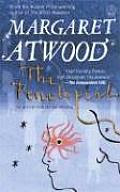Libri
Reviewed by Jodie

Authors taking part in the Canongate myths series have reinvented their chosen stories in a number of ways. Some, like Ali Smith, have rewritten a myth in modern language and placed the action in the present. Others, like Su Tong, have opted to rewrite tales but have used a traditional style and placed the action in a historical setting. Margaret Atwood mixes both of these methods together as she rewrites the tale of Odysseus from the viewpoint of his wife Penelope in ‘The Penelopiad’. She uses snappy, modern language and slang but sets her story in Ancient Greece. She includes a traditional Greek chorus but shapes her examination of Penelope and her maids around modern feminist criticism.
However she seems uncomfortable with moving any further into revisionist territory. Where some would have used Penelope’s voice as a tool to refute how she is portrayed in the original, male authored text Atwood allows the classical version of Penelope to take precedence. Her Penelope is still a weeping woman, a loyal wife, more dutiful and chaste than many other characters in the story. Penelope’s cleverness and intelligence may be emphasised in ‘The Penelopiad’ and Penelope may be given space to comment wryly on her behaviour, ‘Excessive weeping, I might as well tell you, is a handicap of the Niad born…Fortunately in my time there were veils…’, but the characteristics remain. This makes Penelope’s narrative of her life story dull in places, a simple retelling of events from a different perspective that adds little to the readers understanding of the characters. Penelope explains how hard it is to hear stories of her husband with other women and shows how jealous she is of Helen to the reader but she never confronts any of the other characters with these feelings. She remains the dutiful wife, sticking by the feckless Odysseus, swallowing her thoughts.
But could Atwood have a reason behind creating such an insubstantially revised character? It could simply be that she feels revisionist fiction still need to follow textual evidence and can not base characters on things that the original text does not say. However perhaps she is actually presenting a more complex idea. It is possible that the Penelope she has created is only giving the reader select information, that casts her in a good light. Perhaps the character of Penelope is as an unreliable narrator, using her position as storyteller to her advantage. Examining the text there are many indicators that Penelope may be an adept liar. The reader is shown several times when Penelope colludes with her ‘trickster’ husband, for example screaming on their wedding night to satisfy listeners at the door. Penelope tells the story of when her father tried to drown her saying she was rescued by a flock of ducks, yet she seems unable to believe the mythical elements of Odysseus’s travels. She also shows the alternative views people have about her husbands fantastical stories ‘Odysseus had been in a fight with a giant one-eyed Cyclops, said some; no, it was only a one eyed tavern keeper, said the other’ so that the reader can see that she does not swallow the most favourable tales easily. As she casts doubts on her husband’s interpretation of events she may also be asking us to question her own stories.
Penelope creates several carefully woven lies herself, such as the scheme of she comes up with to put off choosing a new husband when Odysseus is said to be dead. She also gets her maids to ingratiate themselves with her suitors in order to be her spies. These schemes suggest a devious mind, a liar, a trickster not the straightforward Penelope the reader is presented with for the rest of the narrative. Towards the end of the book she even says of that she and Odysseus ‘ were – by our own admission- proficient and shameless liars of longstanding‘. Is it possible that the entire narrative Penelope has spun is a carefully constructed pose to disguise her true self and to exonerate herself from guilt about the eventual murder of her maids?
This may be an interesting literary device but it does not keep Penelope’s sections from feeling lifeless at times. The familiar language and linear narrative style can feel mundane, especially when contrasted with the many different forms that the maids chorus is written in, such as poetry, court transcription, sea shanty and academic debate. Clean living Penelope is no competition for the lascivious, angry drama of the maids and it is hard to feel that Atwood has invested as much time in her as she has in these murdered girls. Their sections feel energetic and tightly written as they have much less space in which to voice their complaints. Their controlled, bare words capture the disturbing essence of a traditional Greek chorus, for example:
“Here we are, walking behind you, close, close by, close as a kiss, close as your own skin.”
We’re your serving girls, we’re here to serve you. We’re here to serve you right. We’ll never leave you, we’ll stick to you like your shadow, soft and relentless as glue. Pretty maids, all in a row.” .
The collective narrative of Penelope's maids is full of life and venom. Penelope’s narrative feels flat when it is wholly domestic and realized in modern language and she becomes significantly more interesting when reading the passages about her existence in Hades, where Atwood is free to invent interesting details. Read ‘The Penelopiad’ in order to dwell on the strength of its better passages and skip quickly through it’s more stilted recitation of every day life in Ancient Greece.

No comments:
Post a Comment